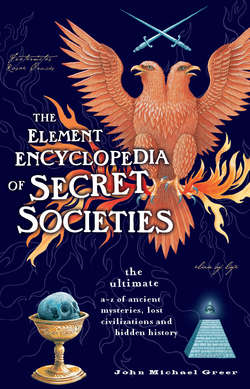Читать книгу The Element Encyclopedia of Secret Societies: The Ultimate A–Z of Ancient Mysteries, Lost Civilizations and Forgotten Wisdom - John Greer Michael - Страница 89
BRUNO, GIORDANO
ОглавлениеItalian author, magician, and (possibly) founder of secret societies, 1548–1600. Born in the little town of Nola not far from Naples, Bruno entered the Dominican Order at the age of 15. At the time, the Dominicans made a special study of the art of memory, a method of mental training that allows the human mind to accurately store and recall large amounts of information. Bruno mastered the art so well that he was taken to Rome to display his skills to the Pope. See art of memory.
In 1567, however, his superiors discovered that he had taken up the study of ritual magic. Bruno abandoned his friar’s habit and fled from Naples across the length of Italy, crossing the Swiss border just ahead of the Inquisition. Safe in France, where the Catholic Church had little influence at that time, he taught astronomy at the University of Toulouse for two years, then moved to Paris, where he wrote his first book on the art of memory. Thereafter he took up a wandering life, traveling through France, England, and Germany, teaching magic and the art of memory. He was suspected by the Catholic Church of founding secret groups of “Giordanisti” (“Giordanists”) in Germany, though no solid evidence for these has surfaced.
In 1591 he returned to Italy, in response to an offer of money from the Venetian nobleman Zuan Mocenigo. It proved to be a fatal mistake. Mocenigo handed Bruno over to the Inquisition, and he spent eight years in church dungeons in Venice and Rome. In 1600 he was burned at the stake as a relapsed heretic at the Campo de Fiori in Rome.
Bruno’s career ended in failure and a wretched death, and his circles of “Giordanisti,” if they ever existed, left no traces. His impact on the later history of secret societies, though, was surprisingly large. Bruno’s version of the art of memory, passed on by his disciple Alexander Dicson, was apparently prescribed for early Scottish Freemasons by William Schaw, the royal master of works who did much to foster the transition from operative to speculative Masonry at the end of the sixteenth century. In the early seventeenth century, the Irish philosopher John Toland, the founder of at least one secret society and a significant figure in the origins of modern Druidry, studied Bruno closely, translated his Expulsion of the Triumphant Beast into English, and reformulated Bruno’s ideas into the pantheism that motivated many eighteenth-century radicals. See Druid Revival; Freemasonry; Schaw, William; Toland, John.
Further reading: Jacob 1981.
